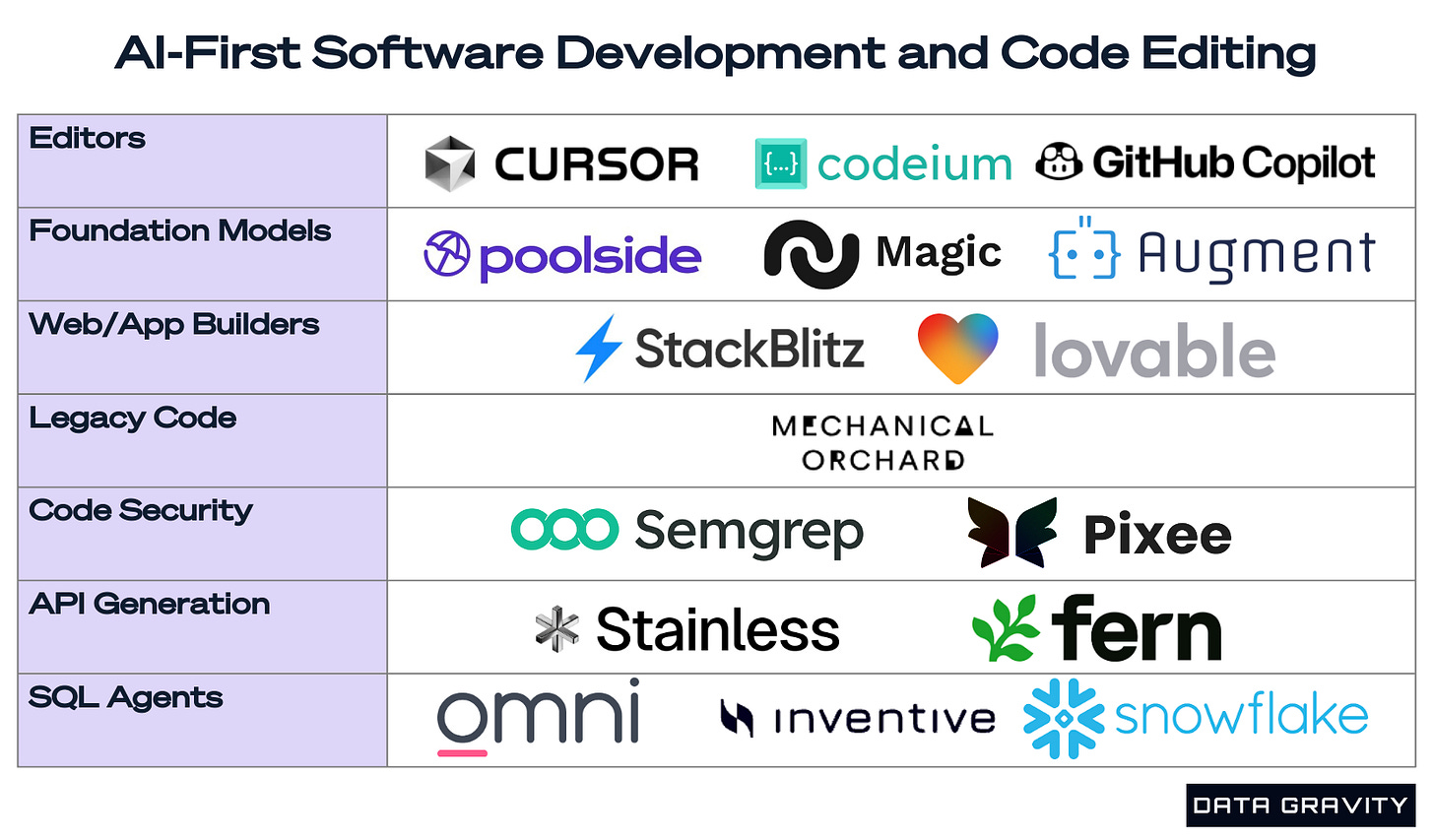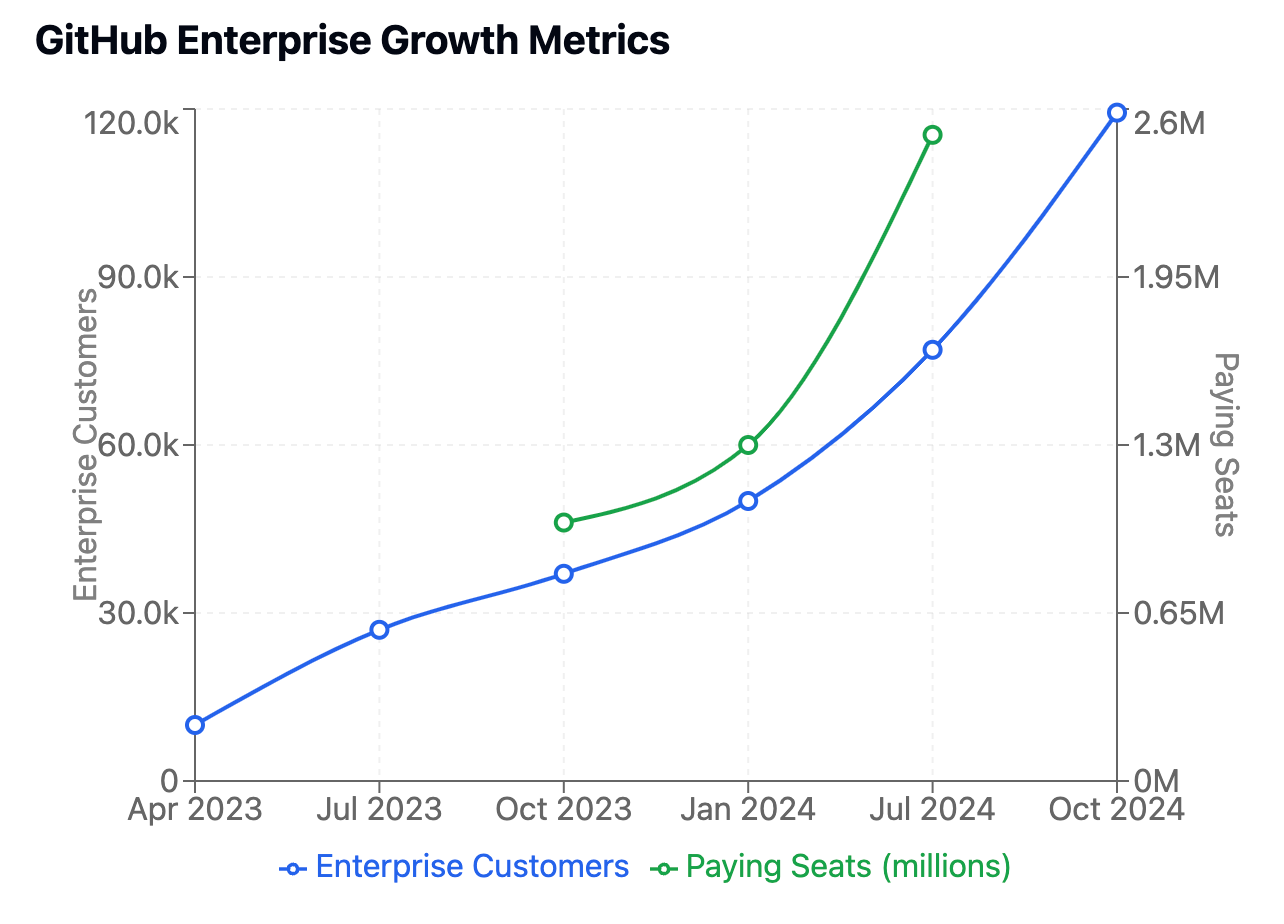AI-First Software Development and Code Editing
How coding agents are reshaping code generation, security, legacy code and more
The integration of AI autocomplete, testing, and autonomous coding agents into software development is AI’s first true killer app. What began as simple code suggestions has rapidly evolved into sophisticated AI-driven systems capable of autonomously generating, testing, optimizing, and securing code. Ask any engineer today, and they will tell you they can’t imagine coding without AI—delivering massive gains in productivity, efficiency, and software quality. AI has become indispensable in modern software engineering, enabling developers to write and maintain code faster than ever.
The AI-driven shift in software development spans multiple categories, with companies specializing in code editing, foundation models, web and app development, legacy code modernization, code security, API generation, and database management. As these tools grow more advanced, they are redefining how developers write, debug, deploy, and secure code.
AI’s journey into Software Engineering and Code
The journey began with GitHub Copilot in 2021, which leveraged machine learning models to assist developers by providing intelligent code suggestions. Github Copilot reached 1M paying subscribers in end of 2023, while growing over 30% quarter-over-quarter. While Copilot introduced developers to AI-assisted coding, others like Cursor have come onto the scene and are often preferred by top Silicon Valley engineers (see our What does Cursor do? piece)
By 2024, AI coding tools had advanced far beyond simple autocomplete. These tools are now agentic, meaning they don’t just suggest code—they iterate, test, and refine solutions before implementation. They also integrate deeply with enterprise repositories, customizing solutions based on internal codebases and unique project constraints. AI coding agents now write over 40% of new code at major tech companies such as Meta and Google, drastically reducing development time.
Looking ahead, the role of AI in software engineering will only expand. Sam Altman has predicted that by 2025, AI will surpass human programmers in competitive programming, fundamentally reshaping the way software is built. The question is no longer whether AI will be a part of software development—it’s how much and which parts of the process will be fully automated.
1. AI-First Code Editors
AI-first code editors are often built on Visual Studio Code’s (VSCode) framework, enhancing it with AI features for generation and editing. This foundation allowed Cursor to support a wide range of VSCode extensions and provides developers with a familiar environment augmented by AI.
Cursor achieved an unprecedented milestone by reaching $100M in ARR in 20 months (see: What does Cursor do?), making it the fastest company to do so. This success is attributed to its AI agents that autonomously generate and test multiple code variations before suggesting the optimal solution.
Similarly, Codeium has gained traction in enterprise environments by supporting on-premises and virtual private cloud deployments, catering to organizations with strict security requirements. These AI-first code editors adopt a model-agnostic approach, utilizing existing AI models rather than developing proprietary ones. Most developers use Cursor with Claude 3.5 Sonnet, while companies like OpenAI use GPT-based models and others use Llama or open-source models.
This strategy aligns with the perspective that “GPT wrappers”—applications built around general-purpose AI models—are actually viable for certain markets, as they provide flexibility and are generally cutting edge. In a March 2023 interview on the Latent Space podcast, Varun Mohan, CEO of Codeium, reflected on the company’s decision to train its own AI model. He acknowledged that, in hindsight, this approach was not ideal, stating, “If I could go back, I would not train my own model.” Mohan emphasized the challenges and resource intensiveness of developing proprietary models, suggesting that leveraging existing models might have been a more efficient strategy.
2. Foundation Models
Companies like Poolside, Magic.dev, and Augment Code are developing proprietary AI models specifically trained to understand and generate code, aiming to enhance software development efficiency and quality. This approach necessitates substantial capital investment; collectively, these companies have raised over $1 billion to fund their initiatives. The development of such specialized models involves extensive training on large code datasets, leading to longer development timelines compared to model-agnostic AI code editors that utilize existing models.
3. Web/App Builders
AI-driven web and app builders are rapidly transforming the development landscape. Platforms like Bolt.new have demonstrated remarkable growth, achieving $20 million in ARR within just 3 months of launch. Similarly, Lovable reached $10M in 3 months, highlighting the increasing demand for AI-powered development tools. These platforms enable users to create full-stack applications with minimal coding, streamlining the development process and making it more accessible. For now, simple websites and apps are the primary use case.
4. Legacy Code
Mechanical Orchard has made significant strides in modernizing legacy IT systems, particularly those reliant on mainframes. Founded in 2022, the company achieved over $10 million in annual revenue within its first 16 months, reflecting strong demand for its code modernization services (such as migrating COBOL and Fortran code). 47% of IT leaders identified budget constraints as a primary obstacle to modernization efforts, underscoring the need for AI-based modernization.
5. Code Security
AI is enhancing code security by automating vulnerability detection and remediation. Semgrep employs AI-powered noise filtering to minimize false positives, providing developers with precise security alerts. Pixee integrates with code repositories to automatically fix vulnerabilities, triage findings from various code scanners, and harden code, allowing engineers to focus on core development tasks. These tools streamline the identification and resolution of security issues, improving code quality and reducing the manual effort required for secure coding practices.
6. API Generation
AI is transforming API development by automating the creation of Software Development Kits (SDKs), which are essential for integrating APIs into various applications. Stainless, for instance, utilizes AI to generate SDKs from OpenAPI specifications, producing idiomatic libraries in languages like Python, TypeScript, Kotlin, and Go. These SDKs include features such as rich type annotations, automatic pagination, retry mechanisms, and seamless authentication, enhancing developer experience and efficiency. Notably, companies like OpenAI have partnered with Stainless to generate all their SDKs, resulting in significant savings in engineering resources and improved integration processes. By automating SDK creation, AI-driven tools like Stainless enable organizations to focus on core product development while ensuring robust and user-friendly API integrations. AI can improve upon existing solutions like Postman, Apigee and Amazon API gateway.
7. SQL Generation
AI-powered tools are increasingly transforming SQL query generation by converting natural language inputs into accurate SQL statements, thereby enhancing data accessibility for users without extensive technical expertise. These tools like Omni and Inventive can generate over 50% of SQL queries in certain applications, significantly streamlining the data retrieval process. However, effective data modeling remains crucial, as the accuracy of AI-generated queries heavily depends on a well-structured database schema and clear relationships between data entities. A robust data model ensures that AI systems can interpret user intents correctly and produce precise queries, thereby maintaining data integrity and delivering reliable insights.












Super helpful :) next one needs to be on AI Governance